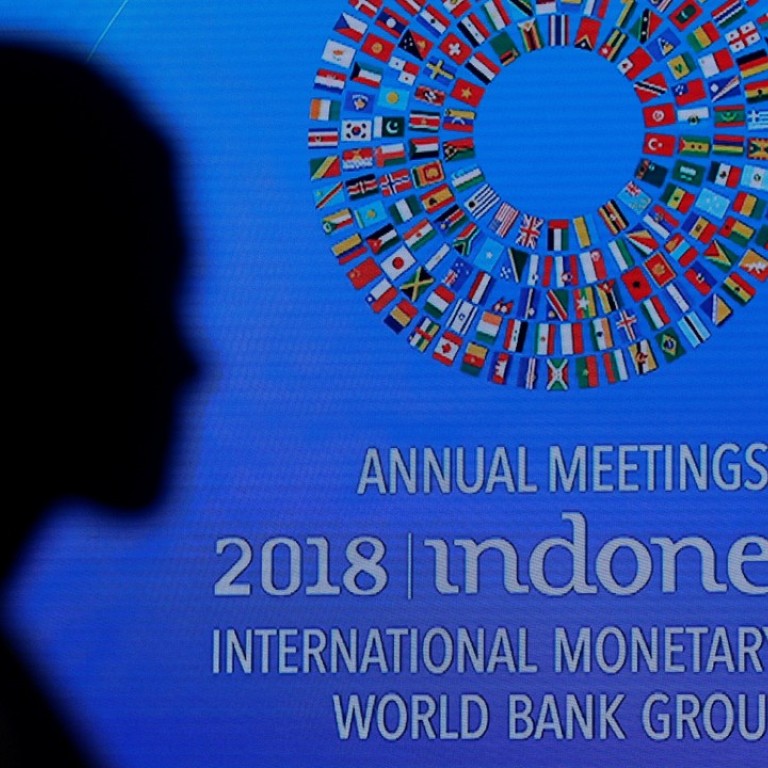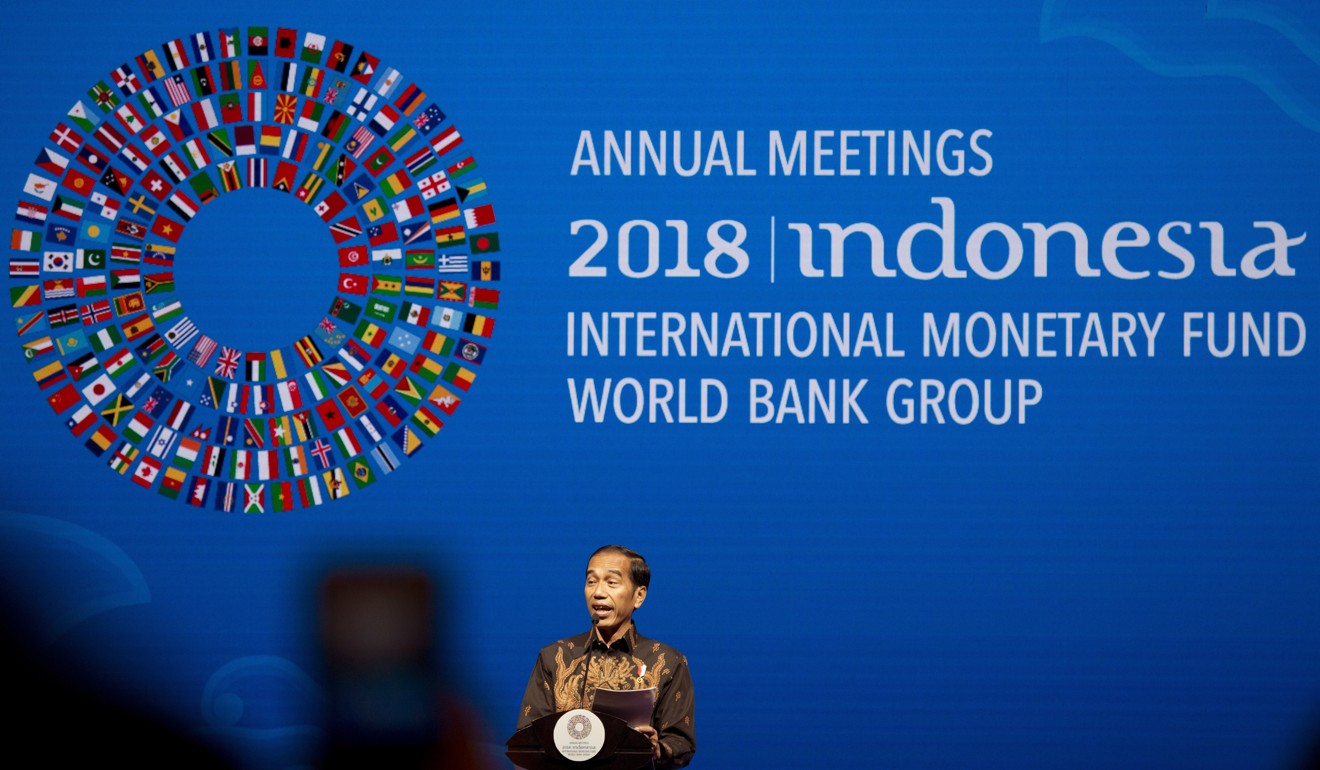
US-China trade war casts long shadow over IMF meeting
Delegates to annual summit in Bali express concern about impact of conflict between the world’s two largest economies
Anxiety about the outlook for the global economy ran high at the meeting of global financial policymakers in Indonesia this week, given uncertainties about how far the US-China trade war would escalate and how long it would last.
Officials and their advisers attending the annual meetings of the International Monetary Fund and World Bank in Bali admitted that the unprecedented nature of the trade conflict took policymakers deep into uncharted territory in terms of predicting its economic impact, both short-term and long-term.
Attempt to isolate China from world trade system ‘will not work’
In general, officials emphasised that the global economy remains strong, with the IMF predicting healthy global growth of 3.7 per cent both this year and next, with the 2018 forecast revised down a mere 0.2 percentage points from the previous prediction in July, largely due to the trade war.
But then came the warnings.
Global growth appears to have plateaued and the world is facing a series of significant “headwinds”, including the trade war but also the impact of US Federal Reserve interest rate rises and higher oil prices.
Rhee Chang-yong, head of the IMF’s Asia-Pacific department, said he was worried about a combination of the three risks materialising at the same time.
An escalation of the trade war – something US President Donald Trump had previously threatened to do – was the biggest risk, Rhee said, while oil prices are already higher than the US$70-75 per barrel price assumed in the latest IMF forecasts.
The Fed’s expected rate hikes have been well communicated, giving countries around the world time to adjust.
However, the risk is that signs of US economic overheating would cause the central bank to accelerate its tightening with broad adverse effects, particularly for vulnerable emerging markets.
But concerns about the trade war and its impact dominated discussions here.
“People are very nervous given the bilateral tension between the two biggest economies, particularly for developing and poorer countries,” said a representative from Algeria.
“And the delegates from the US and China did not say a word. They did not talk. And they did not give us a direction,” he said.
Is China about to let the yuan weaken below seven to the dollar?
Elmutasim Elfaki, a government official from Sudan, said there was a lot of discussion on trade protectionism.
“Trade protectionism used to be adopted by developing countries. But now it is upheld by some developed countries, so it carries a bigger spillover effect … Some people believe it is due to developed countries feeling threatened by China’s rise,” he said.
There was general agreement that the rules governing the global trade system needed to be revised to address concerns about China’s state-sponsored economic system.
While the US has been most vocal in its objections, the fundamental concerns are shared by the European Union, Japan and many other countries.
But, delegates agreed, the representatives of the world’s two largest economies first have to resume talking to each other.
Opportunities for such talks have been fleeting. US Treasury Secretary Steven Mnuchin was not able meet top Chinese trade negotiator Liu He in Bali, since Liu does not to attend the IMF annual meetings.
JP Morgan’s chief China economist Zhu Haibin said he felt the chemistry between China and the US “was definitely not there” at the moment.
“There is clearly a lack of trust, and each one was talking in his own language,” he said, predicting no easing of the tension in the next three to six months.
The longer the conflict lasts, the greater the negative impact.
IMF chief defends Beijing from currency manipulation claims
Shaun Roache, Asia-Pacific chief economist for S&P Global Ratings and a former top IMF official, said that the world economy could deal with the short-term effects of the trade war through stimulus measures, but warned against being “too sanguine” about the long-term impact on China.
Restrictions on Chinese investment in the US could slow the transfer of technology and greatly erode China’s ability to innovate, he warned, attributing the recent sharp drop in Chinese tech stocks in part to a reduction in investor’s confidence in those companies’ continued competitiveness.

One key problem identified by officials here is not knowing exactly what Washington wants from China to resolve the trade dispute, or who the key negotiator is for the US side.
Recent US statement emphasising that the trade fight is not about the bilateral deficit, but rather about structural features of the Chinese economy have brought some clarity, Roache said, but the US needs to be more forthcoming.
“We are starting to understand what the US wants, but it’s still not entirely clear,” he said.
Roache predicted that the trade conflict end-game would revolve around the joint European Union-Japan position advocating changes to global trading rules.
China won’t back down in trade war with US: commerce minister
Europe and Japan were trying to pull Trump back to the WTO framework, saying “we share these concerns too”, Roache said.
In fact, Europe was more exposed to those issues than the US, given its large investment in China “so there is a common front”, he said.
Still, trade tension would probably last for “a while”, in part because the Chinese were wedded to a five-year plan that runs until 2020, Roache said.
“But we are seeing China move a little bit more to the US position. And the US is moving a little bit closer to Europe and Japan now. So probably we are going to see them converge.”
There was some positive news on Friday morning with reports that the US Treasury would not name China a currency manipulator, despite Mnuchin’s warnings in a newspaper interview earlier in the week.
There were also reports that Trump and Chinese President Xi Jinping were likely to meet at the G20 leaders’ meeting in Buenos Aires, Argentina in late November.
But US officials have warned that Trump will not talk trade with Xi if Beijing does not produce a detailed list of concessions, the Financial Times reported on Monday, quoting people familiar with the matter.
Beijing said its had such a list but would not present it unless the US clarified who would serve as the point person with a mandate to negotiate on behalf of the Trump administration.
China’s trade surplus with US hits record high of US$34 billion as trade war rages on
IMF Managing Director Christine Lagarde tried to set an upbeat tone, saying she remained “hopeful” that the dispute could be solved in short order by “fixing rather than destroying the global trade system”, as there was still a “clear appetite for strengthening and improving trade”.
Global financial markets have already felt the chill as the trade tensions and uncertainties increase people’s risk aversion.
Stock markets in Asia plunged on Thursday, following Wall Street’s worst losses in eight months. The Dow Jones Industrial Average shed more than 1,300 points in two trading days from Wednesday. The S&P 500 dropped 2.1 per cent to 2,728.37.
Meanwhile, investors were running for so-called safe havens. On Thursday, gold prices recorded their largest gain in over two years, while US Treasuries jumped after a better-than-expected auction of 30-year notes.


